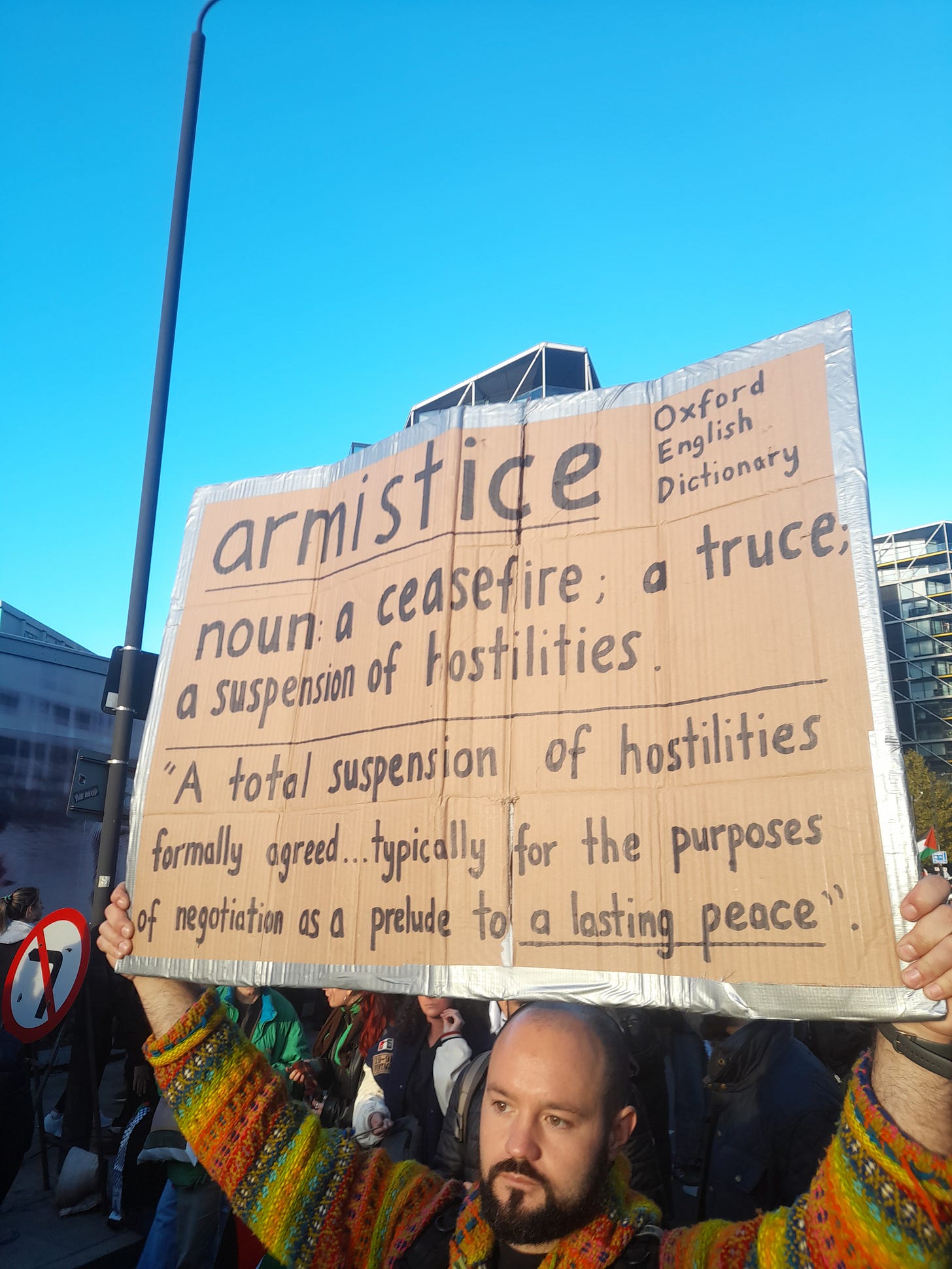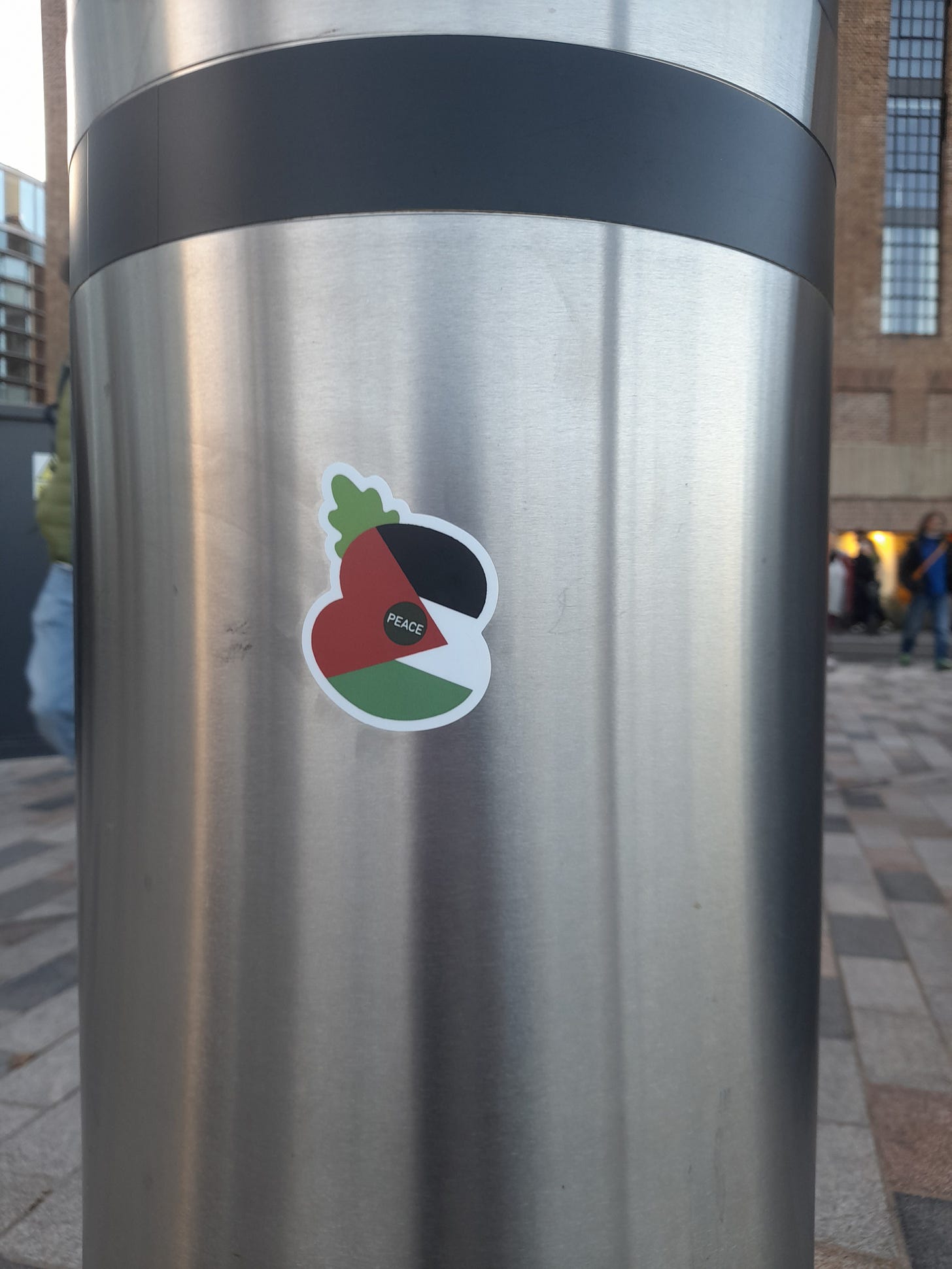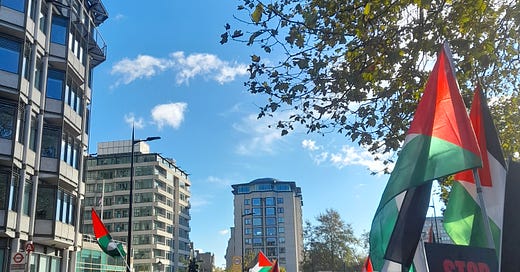Armistice. Noun. Meaning as follows taken from the web-browser: an agreement made by opposing sides in a war to stop fighting for a certain time; a truce. This definition was written, pretty much word-for-word in felt-tip pen on a large brown cardboard placard, to remind people of what the word means.
Thus, it was prescient, that over 300,000 civilians swarmed to the streets of Central London, on the eleventh day of the eleventh month, 2023AD, not to commemorate “Armistice Day”, but to call for a separate armistice in the Middle-East. The gentleman holding this cardboard cut above his head, while the crowds had come to a halt near Battersea Power Station, was donned in a warmly-knitted rainbow-coloured fleece, and a backpack with badges stuck on it from the Green Party, and Free Palestine campaigns and slogans.
11:50
I got there soon before noon, emerging from Marble Arch underground, on the perimeter of Hyde Park. It was sternly cold, but not immensely so. One might call it, chilly. The autumnal sun was beaming bright and orange through the maple leaves and the oak trees like the comforting warm flames amid the hearth of an old-Victorian fireplace and all the rest of it. The point was, arriving punctually before noon, while the crowds were clearly gathering pace and number, it was not supremely difficult to simply get sauntering amidst it all from the get-go. I saw an old seller with a few small Palestinian flags still in stock, perched up by the black-railing on the curb holding an electronic card reader, and I instinctively went over and bought myself one for the uncomplicated price of £5. The way a flock of people were already surrounding the old seller and various more queuing up beside me and yelling to him above the rising roar of the crowd: “How much is it for a flag?!”, I knew I was in roughly the right place.
Then chants reverberated from a couple of bullhorns and the gathering crowds around them in the quietly waking civilians on the street who had decided to be privy to the early afternoon’s activities. Clear call-and-response mechanisms that the crowd could listen to and take on board:
“FREE FREE”
“PALESTINE”
“FREE FREE”
“PALESTINE”
Was perhaps the most basic and understandable of the many that would reverberate around Central London on this Armistice Day afternoon. I soon began to raise my voice for the responses that the Palestinian protestors wanted to hear, which I have only realised not so long ago was spoken with a droll, half-hearted, hundred-cigarette-strong, breathy inflection, when I watched back a video I recorded of the crowds a lot later in the afternoon during the protest.
The flag I had bought now twenty minutes earlier was one of thousands upon thousands flittering and swaying in the cool, sunny air; stark red catching the sun and showing the bloodlust of many gone far too soon, the black a temporary wall of darkness as the Israeli occupation lingers on, the white shining light and peaceful, and the green glistening like new grass in the rays of sun and water, showcasing land that we all need.
Cards and placards were unsurprisingly in full force. The common ones showing text in bold capitals: ‘STOP BOMBING GAZA’, ‘FREEDOM for PALESTINE’, ‘END THE SIEGE’, atop some smaller messages addressed to Sunak and Starmer, that their actions toward the war so far have been negligible and not gathered near enough political teeth.
13:00
After an hour or two of predominantly walking, climbing over low rails into roundabouts and the Hyde Park perimeters at rare intervals to get a better look at the oncoming crowd, swaying my flag, and having recalled most of the chants by now, it was around the period of the crowd getting around Victoria Square and up towards Vauxhall Bridge, where I quite introspectively reflected on perhaps the most controversial of the chants, that had been echoed in great number by now. They were words that had been discussed on multiple media platforms the previous week in the run-up to the protest, including the BBC, which is where I first heard it, “on the radio”. It should be stated here also that there was a chant that went like this:
“RISHI SUNAK’S A WASTEMAN”
or maybe it was:
“THE B - B - C IS A WASTEMAN”
Anyway, multiple placards and posters bared these other words, although it was vocally where its force was felt, for better or for worse. They simply went as follows:
“FROM THE RIVER TO THE SEA”
“PALESTINE WILL BE FREE”
They were certainly not words called out of context, although when I initially heard the slogan on the radio the other day, I will not be shameful in admitting I did not know what it meant. I had an inkling of course, but even then, to borrow a phrase from Wittgenstein: "What can be said at all can be said clearly, and whereof one cannot speak thereof one must be silent."
I learned from this radio interview that it alluded to the Jordan River, and its geographical route, which to the present day flows roughly 156 miles from north to south through the Sea of Galilee and on to the Dead Sea. Jordan lies to its east, while Palestine’s West Bank and Israel lie to its west. Clearly ample information to work with if one does a bit of map-looking and comprehension.
What I gathered was that the chant was being used by pro-Palestinian protestors as a call for Israel to give back land that was once Palestine’s. The West Bank is still a large Palestinian area that lies adjacent to the Jordan River’s (or River Jordan’s) west, hence its name, although there is still a large stretch of the river’s north that borders Israel’s current-day northwest. This is why there is contention in terms of geography and land, because there are these areas that are now named in another country’s hands, or so it says so on a map. This is what I would understand to be the Palestinian meaning of the slogan, and is the side I took and chanted for during the protest.
On the flip side, there are those, predominantly of Jewish faith - and not just Israelis, there are millions globally - that deem the slogan antisemitic, used to incite fear and hate, some would even argue, baring genocidal undertones. In a deeper sense, a chant used by pro-Palestinians in aim of trying to reclaim land that they believe is theirs - which may be argued to be true - whilst banishing people of Jewish heritage in the process from what is, current-day Israel. This is obviously where matters of history, politics, and religion get very complex, and one has to be wary that they do not take any information with a grain of salt.
I will try not to go on too long about this, because there is a propensity that I will get lost with grains of salt. Nowadays, Greater Israel is an expression that carries varying meanings over time.1 It is often used in an irredentist way, to refer to the desired or historic borders of Israel. N.B. I advise you to look up the term “Irredentism”, because it is important. The common definition of the term Greater Israel is the land of what is currently the State of Israel, together with the Palestinian territories. There are other definitions by Revisionist Zionists. I won’t leave “Revisionist Zionism” there. Revisionist Zionism promotes expansion and the establishment of a Jewish majority on both sides of the Jordan River. Why is this important? Truthfully, I do not know. It has a lot to do with geographical definitions of what is termed the Land of Israel, or, the Promised Land. You kind find this in the Bible; in the Book of Genesis, the Book of Deuteronomy, and the Book of Ezekiel.
What am I trying to say here? I am saying, in essence, that these matters have a multitude of different meanings and weights. That sounds like I am not really saying anything and being immensely vague. But this is the hand that I, and perhaps others have been dealt. We live in the 21st century; feudal- and-techno-capitalism is what we are battling. We are fed news via radio bulletins, television flashes, phone buzzing, and newspapers. Perhaps the latter is becoming a little less full of the solace and truth that we all need. It is not easy. There were buzzwords dotted around people’s placards on this day. The most meaningful of which was: “Intifada”, meaning a rebellion or uprising, a resistance movement. Perhaps that is where we draw some more wholesome meaning for our souls.
14:00
God, what next? Oh yeah. This was a rather lighter touch to the day, that I provoked. God, can you believe that? I actually instigated something. Ha! Ha! Ha! Huh… Basically what happened was the crowd had come to a complete and abrupt halt for a good half an hour, perhaps more. I was standing on my own, trying to avoid eye contact with pretty much anyone and everyone for fear of them thinking my hair looked stupid and they wanted to kill me. I was swaying my flag to-and-fro in the air rather innocently in the breeze (to be honest there wasn’t much wind at all it was actually quite pleasant), quietly chanting, “CEASFIRE NOW”, when prompted, and then after this waiting period of what I can only describe now as getting stared at like I was a lighter Grim Reaper, or Joaquin Phoenix’s Joker, we all finally got a move on again.
I spotted this pub when angling my head 90 degrees to the left, over the sea of heads of the marching crowd’s width, and I stared at it for a couple of seconds. It was called, White Swan. I am not kidding, you can look it up. It is on Vauxhall Bridge Road just before the bridge. Quite a few Caucasian males and others were peering through the windows, standing would you believe, with the their thumbs up and a pint in hand as if they were the dog’s bollocks. I cannot really recall if this is verbatim, it probably isn’t, but I veered toward the pub very slightly, raised my flag, and opened my mouth, screaming something like: “YEAH! 2 O’CLOCK IN THE AFTERNOON AND YOU’RE AT THE BLOODY PUB!”
I know I spoke out of line. As I say though, it did provoke like one girl and her boyfriend to laugh, and I skipped forward on my way in aid of avoiding more curiosity, incredulity, or sorrowful scorn.
15:00
This is where things really got a bit more serious. When were they ever not? The cold was more biting, though it was still clear skies and sun. Throughout the march, from near enough the moment I set foot on Park Lane and joined the crowd, there were aircrafts in the sky. Not many, but clearly authorities were accounting for it all, perhaps some form of contingency if things got out of hand. It was mainly a helicopter high in the air, unfaltering in following the path of the protest; a rather large black one calling and rumbling at various points that made one crane their neck up to see what they had heard.
By the time we got over Vauxhall Bridge chants were really quite powerful. There were many people perched on the side of the bridge with cameras, standing stoically to see who was crossing and what they advocating, what they were chanting. The crowd veered a sharp right from Vauxhall Underground Station and headed towards Battersea Power Station. There was a guy with a bullhorn again at one point around a bend between the buildings who confirmed something along the lines of: “You are part of the biggest protest for Palestine in British history. This is a great message against the far-right.”
The crowd slowed right down by the time we reached Battersea. That was where I caught sight of the guy with the cardboard cut of the message about Armistice. There was also one, that I had caught sight of much earlier during the march, baring the words: “THE OTHER SIDE THINK ‘FROM THE RIVER TO THE SEA’ IS MORE GENOCIDAL THAN ACTUAL GENOCIDE”.
It was nearing on a sea of people slowing, undulating, waving back and forth, as we could make out the stage at the front beside the Covent Garden Market building. People came to take a stand. Moreover, people came to listen. Mick Lynch gave a short speech soon enough, along with various other guest speakers on the side of the Palestinian cause.
It was maybe after about 45 minutes or so, when one of the last speakers, it was actually two or three, read out the names of children that had been killed during the bombing of Gaza recently. To describe the moment as harrowing, and the feeling of sickness in the stomach would be a great understatement.
Eventually, one of the speakers invited the crowd that had gathered in the evening sun to join in with a two minute silence. I would like to think everybody present for that moment did so unashamedly. Of course, it carries a great sense of shame, to realise that you are perhaps silently responsible for the mass slaughter of innocent people. It carries a weight like no other to finally acknowledge that you are a White British national, part of a long history responsible for colonising, enslaving, and imprisoning mass parts of the globe. I could do nothing else but just feel terribly depressed and sad.
Of course, this was not the main reason I went on this “Armistice Day” march - to get depressed and sad. I went because I wanted to stand and walk beside other people who felt similarly, manic in their own way, wanted to cause some little tremors around the Cenotaph and Buckingham Palace and Westminster and turn the focus to something else for a while.
17:00
I was comforted to read, later when I went to my university library, that hundreds of thousands of people took part in the pro-Palestinian march in London. The Metropolitan police said around 300,000 people converged on the capital, with organisers putting the figure closer to 800,000, claiming it was one of the biggest marches in British history. Certainly a figure, in my eyes at least, that shows that there is force in numbers, and that this feudal-capitalist age does have its benefits when the word is spread on social platforms, and people are able gather the knowledge and strength to take a stand.
I stayed in the library for another few hours, with my little Palestine flag peeping out the top of my backpack, even though I told the librarian on the way in: ‘Ah, don’t worry, I’ll take it out in a minute’. I sat opposite a new friend of mine and we had a chat about things and what we’d been doing with our day and the work we should be getting on with and so forth. It was a more peaceful way to culminate the day’s affairs. But is peace the answer I hear you say? Well, I am not sure if that is what I was advocating, perhaps it was for liberation, and that the fight will go on tomorrow


Greater Israel - Wikipedia





